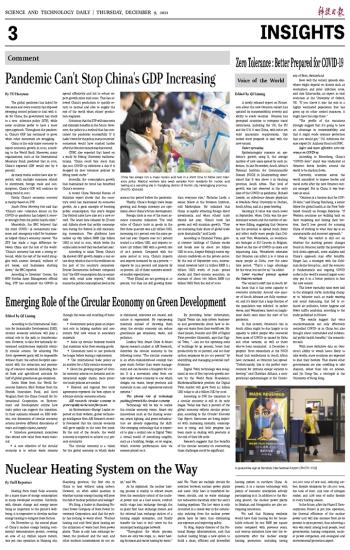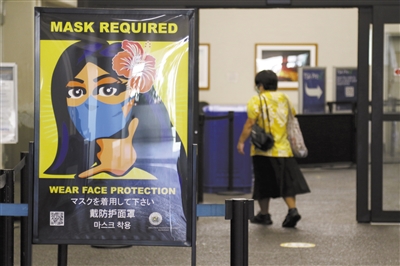
 |
| A quarantine sign at Honolulu International Airport. (PHOTO: VCG) |
A newly released report on Nature. com about the new Omicron variant has updated its transmissibility, severity and ability to evade vaccines. Omicron has prompted countries to reimpose travel restrictions, including the UK, the EU and the U.S. It was China, with strict yet valid quarantine requirements, that looked most prepared to deal with the new variant.
Faster spreading
Epidemiologists measure an epidemic's growth using R, the average number of new cases spread by each infection. In late November, South Africa's National Institute for Communicable Disease (NICD) in Johannesburg determined that R was above 2 in Gauteng province, South Africa. That level of growth was last observed in the early days of the COVID-19 pandemic, Richard Lessels, an infectious-disease physician at KwaZulu-Natal University in Durban, South Africa, said at a press briefing.
Gauteng's R value was much lower in September, when Delta was the predominant variant and the number of cases were falling, suggesting that Omicron has the potential to spread much faster and infect vastly more people than Delta, said Tom Wenseleers, an evolutionary biologist at KU-Leuven in Belgium. Based on the rise of COVID-19 cases and sequencing data, Wenseleers estimates that Omicron can infect 3 to 6 times as many people as Delta, over the same time period. "That's a huge advantage for the virus, but not for us," he added.
Lower vaccines' potency against the Omicron variant
The variant's swift rise in South Africa hints that it has some capacity to overcome immunity. Around one-quarter of South Africans are fully vaccinated, and it's likely that a large fraction of the population was infected in earlier waves, said Wenseleers, based on heightened death rates since the start of the pandemic.
In this context, Omicron's rise in South Africa might be due largely to its capacity to infect people who recovered from cases of COVID-19 caused by Delta and other variants, as well as those who've been vaccinated. A December 2 preprint from researchers at the NICD found that reinfections in South Africa have increased, as Omicron has spread. "Unfortunately, this is the perfect environment for immune escape variants to develop," said Christian Althaus, a computational epidemiologist at the University of Bern, Switzerland.
How well the variant spreads elsewhere might depend on factors such as vaccination and prior infection rates, said Aris Katzourakis, an expert in viral evolution at the University of Oxford, UK. "If you throw it into the mix in a highly vaccinated population that has given up on other control measures, it might have the edge there."
"The profile of the mutations strongly suggest that it's going to have an advantage in transmissibility and that it might evade immune protection that you would get," U.S. infectious disease expert Dr. Anthony Fauci told NBC.
Safer and more effective: zero tolerance on COVID-19
According to Bloomberg, China's "COVID-Zero" stand was vindicated as Omicron forces borders around the world to be shutten down.
Currently, countries across the world scrambled to impose border and travel curbs after the new Omicron variant emerged. But in China, it was business as usual.
"Omicron is a booster shot for COVID-Zero," said Huang Yanzhong, a senior fellow for global health at the New York-based Council on Foreign Relations. "If Western countries are walking back on their reopening and closing their borders, they'll lose ground for accusing China of sticking to what they say is an unsustainable and incorrect approach."
While the verdict is still out on whether the startling genetic changes found in Omicron justify the preemptive lock down approach, some analysts said China's approach may offer benefits. Kinger Lau, a strategist with the Goldman Sachs Group Inc., said the economic fundamentals and ongoing COVID curbs in the world's second largest economy put it in a better position to face the new variant.
The lower mortality rates were tied to the stringent curbs, including changes in behavior such as mask-wearing and social distancing, that led to reduced air pollution, better hygiene and fewer traffic accidents, according to the study published in Nature.
"The results suggest that virus countermeasures not only effectively controlled COVID-19 in China but also brought about unintended and substantial public health benefits," the researchers said.
With more definitive data on Omicron's ability to wreak havoc likely to take weeks, more countries are expected to shut their borders. That shows other governments are also unwilling to take chances, rather than rely on science, said Jin Dong-Yan, a virologist at the University of Hong Kong.


 Next
Next




